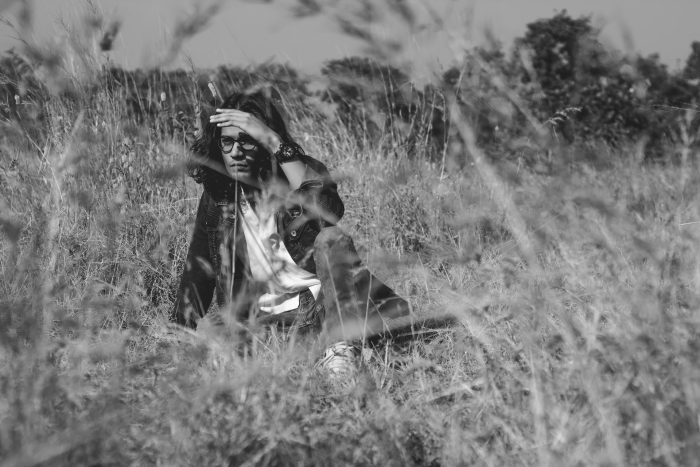It’s 4 a.m.
I’ve been trying to get back to sleep, even though the world outside my window—an urban jungle normally a living cacophony of life, garbage trucks rumbling, food purveyors delivering exotic vegetables to the hipster gastropub—is dead silent.
But it’s not silent in my head.
There’s a nasty debate raging between parts of me. It’s completely rattled my calm; sleep will not be returning anytime soon, if at all. My old, wounded part still counsels, “Don’t trust people. When you let them close, they will hurt you.”
Then there’s the new me that has gained so much by being vulnerable. I’m at ease inviting people into my life. These aspects of my Self battle to control the narrative of how I will face the last vestiges of doubt I have about cultivating friendships.
I’ve only recovered my willingness to trust people in the past five months. It’s been like Christmas every week as I’ve extended myself and started building new friendships for the first time in six years. I’m connecting with others in a new authentic way that came about from working with a therapist.
Before working with a therapist, I had no idea what wounds were and their power over my daily decisions. I didn’t know how deep-seated fears related to those wounds could be. I wasn’t even aware of what those fears were. Or that I could learn about the parts of myself that were dominant and those that felt abandoned, ignored, and unloved. I’d know how to help those parts communicate with each other.
My disquiet today comes after a string of planned connections with friends sequentially got cancelled. I felt the echoes of an ancient pain say, “I’m still here, waiting to welcome you back.”
My Loneliness was lonely. I hadn’t been listening to it, and it wanted my attention.
My doubts formed a crack in my psyche that my Loneliness could exploit and whisper through. In my doubts, these thoughts were playing on a loop that wouldn’t let me rest, “Is the newfound growth I earned this year so tenuous that I can’t bear a string of disappointments? Come on; meetings get cancelled, life happens, people move on… get over it.” These self-admonishments weren’t helping me.
Thankfully, I have an ally—my wife. Outwardly, it was painfully evident that something was wrong this morning. With love and care, she engaged me in dialogue. She asked good questions and reflected on what she heard. She listened intently to my concerns and didn’t offer advice. I felt heard, and that’s what I needed. She provided everything my friends offered me and more because of our love and history.
Every morning we get to share time together on our drive to work. By the time we parted today, I had a better perspective. I connected with all the times people had seen and acknowledged me in the last two weeks. The part of me that embodies my Loneliness tried to blind me to this information.
My Loneliness is willful, jealous, and spiteful. It doesn’t care for me. It wants my utter devotion and wants to be the only relationship I have.
For six years, it won my devotion. I shut down completely after two people left my life suddenly; one died unexpectedly at a young age, and the other ghosted me. My Loneliness capitalized on those events and said, “There you go. I’m right. When you let people close, every one of them will eventually hurt you.”
During those years, I compensated for my lack of connections. I still needed to be acknowledged as valuable and useful. That’s the standard men are taught by society to measure themselves against. How useful are you? What can you do? Essentially, what kind of human doing are you? I survived by putting on a mask of strength.
I was already the strong, reliable guy, that “guy” who knew stuff and would always lend a hand to make things happen. To deal with my fears, I’d try to make myself super useful to others; how could they leave me and all the good stuff I did for them?
Many people liked me, or rather I thought they’d like me for whom I’d let them see. That subtle distinction was the barrier that I had to break down. I was a strong man hiding behind a mask. I was finally at a point of aching Loneliness when I found the courage to engage in therapy. I got to work becoming an even stronger man by becoming vulnerable. It was time to drop my mask.
The safest place to do that was by giving myself the gift of asking for help from a caring therapist.
Getting past the toxic idea that I couldn’t trust anyone tested my strong man persona. I felt brave when I admitted to myself that I was lonely. I had endured the wilderness of Loneliness and separateness even while people surrounded me. Wearing my mask had cost me dearly.
There are three reasons therapy was right for me.
1. I got to work, and nobody else had to know I’d chosen that. Therapy can be a private space to explore what is good for us to explore.
2. The beauty of therapy is that I got to choose the degree I entered a trusting relationship with my therapist. I found the right one for me; I felt how much she wanted to support my recovery.
3. A good therapist will seek to help you understand yourself and won’t offer advice, guiding you instead to find your own choices that will serve you best.
Control over my process made it safe to try therapy. I got to choose what and how fast I changed.
Through therapy and all the work between sessions, I experimented with levels of vulnerability and slowly learned how to risk showing up without my mask of strength. My authentic Self emerged from behind the mask. That Self is genuinely relatable and attractive. It’s at ease inviting others to engage and fostering genuine connections.
Being vulnerable has changed my life.
Today doubt was whispering loudly in my ear. Did you really drop your strong man mask? I know I did; it’s easy to feel when expressing my authentic Self. I enjoy the solid core presence I can share freely, which gives me a gentle strength I’m not afraid to display openly, the antithesis of wearing a mask.
Today I’m in need. I can vulnerably reach out and let the people in my life know I want to connect. That action alone quells my Loneliness. Embracing vulnerability has become a cherished strength in my life.
I didn’t like myself when I was hiding. It was lonely. Not trusting caused me to be the one that ended up hurting me.
The people in my life really did care for me. The only person I cheated of liking me was me.
To anyone else who is hiding, therapy is a path to explore a way out. We are the only ones who have to know we are in therapy. We determine what we want out of the process. Seeking it can be seen as a vulnerable choice.
As Brené Brown notes, “Vulnerability is not weakness; it’s our greatest measure of courage.”
~
Please consider Boosting our authors’ articles in their first week to help them win Elephant’s Ecosystem so they can get paid and write more.












Read 76 comments and reply